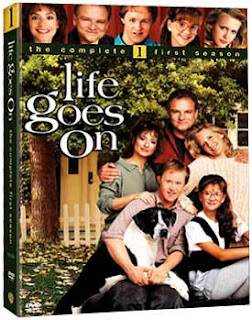
Film: "Life Goes On"; Cast: Sharmila Tagore, Girish Karnad, Om Puri, Soha Ali Khan, Mukulika Banerjee, Neerja Naik and Rez Kempton; Written and Directed by: Sangeeta Dutta; Rating: ****
One of the many pleasures of watching this supple evocative family saga is to see the timeless Sharmila Tagore share screen space with her real-life daughter Soha, who by the way, has never looked lovelier.
That inner-glow comes from the company she keeps in this gentle drama suffused in melodious whispers and mellifluent suggestions of tunes long-forgotten and yet stored in the most inviolable chambers of the heart.
Luckily for us, and the film, the Sharmila-Soha togetherness is not harped upon. There are far bigger issues and virtues to do with family ties and cultural disaffection secreted in the storytelling, propelling our hearts to soar in ways that modern cinema doesn't allow.
When did Indian cinema cease to be about emotions? You wonder as you watch the silken cascade of debutante director Sangeeta Dutta's family secrets and emotions gush out in a Bengali family in London, when one fine morning the mother simply drops dead on the kitchen floor.
The mother-figure, a constant and non-negotiable pivot of every family, here seems to be much more in demand than usual. All her three daughters seem to be stricken with heart problems that no cardiologist can tackle. Blessedly, the mother of the family, Manju, is played by the gloriously imposing Sharmila Tagore.
"Life Goes On" captures the suddenness of bereavement in snatches of sounds, visuals and dialogues. There's far more austerity in the expression of the anguish and despair after the sudden bereavement than in Mira Nair's masterly study of coming to terms with death in "The Namesake". At times, you long for more time between the members of the grieving family.
There are no big breakdown sequences after the mother's death. Everyone gets busy trying to pick up the threads of life. Everyone is a bit selfish - that's the family secret that the film doesn't get judgemental about.
A lot of vignettes connecting the mother's memories to the present times appear predictable, even pedestrian. The director, fearless in her maiden endeavour, doesn't shy away from making her film look familiar.
From death to reconciliation, "Life Goes On" moves at a gentle pace.
The echoes and resonances of a life that lingers after death is created through a blend of sounds and visuals capturing the feeble but flamboyant light of London at dawn and dusk. The parks, bridges, two-storeyed residential areas and their incriminating quietude are ably captured in the film, as are the pain and postures of grief and mourning.
The Rabindra Sangeet in the original Bengali and a rather quaint Hindi translation suffuse a warm and endearing quality to the proceedings. The cross-cultural references resonate across the film's somber skyline with unobtrusive emphasis.
The film creates a fine balance between real-life elegies and their cinematic rendition. A lot of Sangeeta Dutta's mise en scene project a first-time director's effusive affinity to creating a defiant poetry out of the prosaic rhythms of life.
Life for the Indian Bengali family in Britain never seemed more complex.
At times you feel the director has 'Britain' more than she can chew. The sub-plot, on Islam-phobia brought in through Soha's boyfriend Imtiaz (Rez Kempton) and the rock band that he and his friends put together despite Mullahs' objections, seems to go off into tangent away from the Bengali's family's bereavement.
But at the end, when we see the band playing a punk version of Hemant Kumar's "Ganga Aaye Kahan Se" laced with a French rap section, you smile for the cultural shifts and translocations that the plot endeavours to establish without falling off the map of the human heart.
The performances by veterans Girish Karnad, Om Puri and Sharmila Tagore are uniformly skilled and supple. Among the younger members, Soha Ali Khan as the youngest Cordelia-like daughter to Karnad's King Lear emerges strong and yet vulnerable. But it is the unknown young actress Neerja Naik who plays Soha's lesbian sister, who proves a complete natural.
The subtle, delicate and utterly disarming play of light and shade, of mellow memories and the hard present-reality, of the various cultural cross-generation clashes - all these could have made any film heavy.
Not "Life Goes On", it is a gloriously polished and a poised look at the chaos that rules the bereaved heart in our troubled times. This film is a triumph on many levels and layers. And you don't have to be a Sharmila Tagore fan to realise how resonant her presence can be even when she is lost to the plot.







0 comments:
Post a Comment